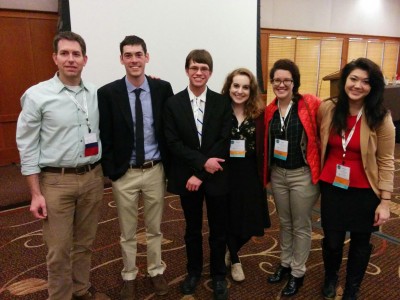University of Puget Sound students win 1st and 2nd prize;
Teams assessed Columbia River wind-energy storage power plant
TACOMA, Wash. – Ten University of Puget Sound students tackled a series of environmental issues facing a proposed Columbia River wind and hydro energy project—and walked away with $2,700 in prizes.
The two teams of students swept away the 1st- and 2nd-prize honors in the Environmental Challenge at November’s annual conference of the Pacific Northwest International branch of the Air and Waste Management Association (AWMA).
The top team of students is now eligible for an even tougher challenge: competing on an international scale. The AWMA, which represents environmental professionals in 65 countries, will hold its Environmental Challenge International in New Orleans in June 2016. The students will assess the viability of entering this competition closer to the time.
For the local event five teams of college students from Washington, Montana, and Idaho were asked to prepare an optimal solution to a complex true-to-life environmental problem.The chosen project was the proposed JD Pool Pumped Storage Project on the Columbia River in Klickitat County, Wash. The plant, slated for construction in 2023, will produce 1,200 megawatts—enough to power a city the size of Seattle. Pumped storage plants are designed with water reservoirs at two different heights. This enables the plant to store wind energy: when the wind is blowing, water is pumped up to the higher site; when energy is needed, the water is released and falls, generating power.
The 10 Puget Sound students in the event are enrolled in Puget Sound’s Environmental Challenge interdisciplinary course, which offers this experiential learning opportunity. The student competitors were asked to create plans to address potential environmental concerns, such as water rights issues, contaminated soil, landslide dangers, asbestos, and the general construction and design of the facility.
In September the students—who major in chemistry; geology; economics; biology; psychology; Environmental Policy and Decision Making; and Science, Technology, and Society—formed two teams. The teams then put their heads together, applying their diverse knowledge and weeks of research, and created detailed written and oral presentations.The panel of judges was made up of environmental professionals attending the three-day AWMA conference. Puget Sound carried away the top two prizes, while Associate Professor of Chemistry Dan Burgard was awarded Best Oral Presentation for a talk on his student-supported research on marijuana usage in Washington state.
Peter Davidson ’16, Bella Graves ’16, Caroline Hamilton ’17, Cliff Hayashi ’16, and Jack Marshall ‘16 made up the team that took 1st place and won $1,500. Madison Bertis ’17, Mike Burley ’16, Adam Herbertson ’17, Annastasia Morairty ’17, and Becca Tansey ’16 were in the team that took 2nd place, for a prize of $1,200.
“We are exceptionally proud of the students for gaining this recognition,” said Burgard, who teaches the Environmental Challenge course. “This is a real-life environmental problem that can really only be solved by applying skills from a range of disciplines. So this project took not only hard work and independent thinking, but real teamwork skills and, ultimately, a solution grounded in reality.”
Experiential learning has long been an integral part of the curriculum at Puget Sound. Backed by new funding from the Andrew W. Mellon Foundation, it is now also the driving principle for a growing array of on-and-off-campus academic offerings at the national liberal arts college.
Press photos of the two winning teams are available upon request.
Photos on page: From top right: Columbia River, near The Dalles, Klickitat County, by Cacophony; The student team that took first place, with Professor Dan Burgard; The student team that took second place. (See story for names of students in the teams.)
Tweet this: First & 2nd prize for @univpugetsound students in #windpower #Environmental Challenge @AirWastePNWIS #ColumbiaRiver
Follow us on Twitter! twitter.com/univpugetsound

